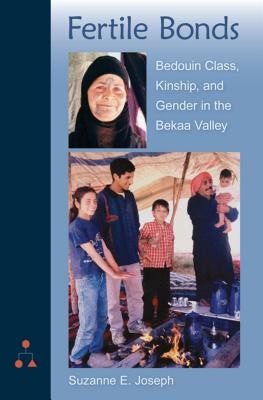
- We will send in 10–14 business days.
- Author: Suzanne E Joseph
- Publisher: University Press of Florida
- ISBN-10: 0813044618
- ISBN-13: 9780813044613
- Format: 16 x 23.6 x 2 cm, hardcover
- Language: English
- SAVE -10% with code: EXTRA
Reviews
Description
"Provides rich new ethnographic material on a little-known population, the Bedouin of the Bekaa Valley in Lebanon. It positions such marginal populations in the broader theoretical context of modernization and health and demographic transitions."--Allan G. Hill, Harvard University
With an average of over nine children per family, older cohorts of Bedouin in the Bekaa Valley of Lebanon have one of the highest fertility rates in the world. Many married couples in this pastoral community are close relatives--a socially advantageous practice that reflects the deep value Bedouins place on kinship.
To outsiders, such family norms can seem disturbing, even premodern. They attract assumptions of Arab "backwardness," poverty, and sexism. Remarkably, Fertile Bonds flips these stereotypes. Anthropological demographer Suzanne Joseph shows that in this particular group, prolific birth rates coincide with moderate death rates and high levels of nutrition. Despite broader class differences between Bedouins and peasants, members of Bekaa Bedouin society rely heavily on kinship ties, sharing, and reciprocity and experience a high degree of social and demographic equality.
This story, unfamiliar to many, is one that is fading as traditional nomadic livelihoods give way to encapsulation within the state. With the help of this surprising, nuanced study--one of the first of its kind in the Middle East--knowledge of such marginalized pastoral groups will not vanish with the disappearance of their way of life. Joseph's book expands our understanding of peoples far removed from consolidated government control and provides a broad analytical lens through which to examine demographic divides across the globe.
EXTRA 10 % discount with code: EXTRA
The promotion ends in 17d.16:11:58
The discount code is valid when purchasing from 10 €. Discounts do not stack.
- Author: Suzanne E Joseph
- Publisher: University Press of Florida
- ISBN-10: 0813044618
- ISBN-13: 9780813044613
- Format: 16 x 23.6 x 2 cm, hardcover
- Language: English English
"Provides rich new ethnographic material on a little-known population, the Bedouin of the Bekaa Valley in Lebanon. It positions such marginal populations in the broader theoretical context of modernization and health and demographic transitions."--Allan G. Hill, Harvard University
With an average of over nine children per family, older cohorts of Bedouin in the Bekaa Valley of Lebanon have one of the highest fertility rates in the world. Many married couples in this pastoral community are close relatives--a socially advantageous practice that reflects the deep value Bedouins place on kinship.
To outsiders, such family norms can seem disturbing, even premodern. They attract assumptions of Arab "backwardness," poverty, and sexism. Remarkably, Fertile Bonds flips these stereotypes. Anthropological demographer Suzanne Joseph shows that in this particular group, prolific birth rates coincide with moderate death rates and high levels of nutrition. Despite broader class differences between Bedouins and peasants, members of Bekaa Bedouin society rely heavily on kinship ties, sharing, and reciprocity and experience a high degree of social and demographic equality.
This story, unfamiliar to many, is one that is fading as traditional nomadic livelihoods give way to encapsulation within the state. With the help of this surprising, nuanced study--one of the first of its kind in the Middle East--knowledge of such marginalized pastoral groups will not vanish with the disappearance of their way of life. Joseph's book expands our understanding of peoples far removed from consolidated government control and provides a broad analytical lens through which to examine demographic divides across the globe.


Reviews